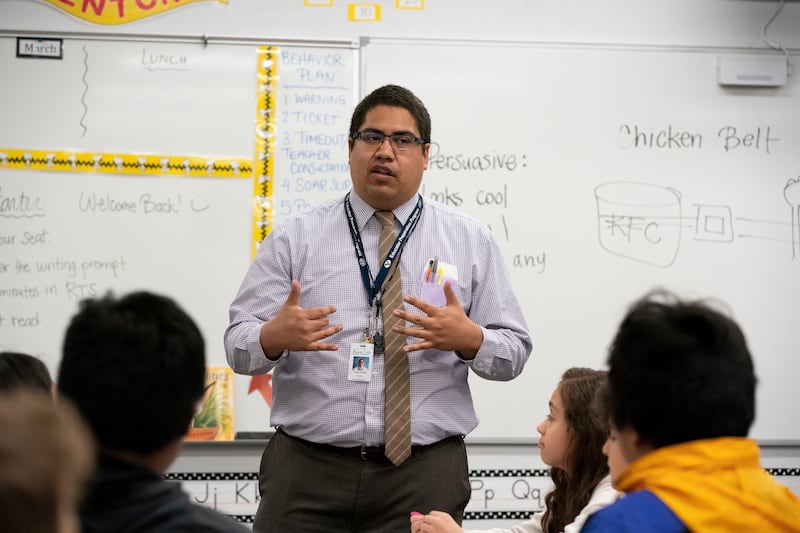Middle school teachers who are vexed by kids who interrupt, ignore the lesson in favor of their own pursuits or otherwise act out should try a counterintuitive approach to help their charges get on task.
The key is to focus on the positives in the classroom and look for opportunities to praise and encourage, rather than correct, according to researchers at Brigham Young University and the University of Kansas.
Their study, published in the Journal of Positive Behavior Interventions, said when middle school teachers praise as often — or more often — than they reprimand students, on-task behavior for the whole class improved 60%-70%. That was as true of children at high risk of emotional and behavioral disorders as for other students. Both grades and behaviors improved significantly.

The more you praise and the less you reprimand — particularly with students who have depression, anxiety, anger or other emotional problems — the better the outcome, said BYU education professor and the study’s lead author Paul Caldarella.
Nor are the findings limited to middle school, or even to classrooms, Caldarella said. The researchers — including Ross Larsen and Leslie Williams at BYU and Howard Wills at University of Kansas — had earlier shown a similar effect in elementary school classrooms. When praise outstripped correction, more students stayed focused on their task. But the findings were stronger in middle schools than in elementary schools.
“It’s really important to focus on positives this year,” said Caldarella, noting the challenges the pandemic has posed for students who have been in and out of classrooms and sporadically forced to contend with school held online.
Middle school is an especially vulnerable time for students, said Caldarella, whose own son started middle school this week. “He was really kind of anxious about it and wondering what it is going to be like. And going from one teacher to having five or six different teachers, a new peer group, a much bigger school environment and higher academic expectations,” he said. “And then you add on top of that a COVID or post-COVID year and you’ve got a lot of students who are under a lot of stress or strain.”
While this study didn’t look at parents using praise, he noted the findings could be significant for them, as well. For one thing, they are teachers of their children. “I think the principles still apply.”
Advice for the ages
The power of praise and the harm that harping on negatives can do to children doesn’t surprise Marianne Pelletier, who’s now the superintendent of Maine’s Catholic school system.
When she worked with emotionally fragile kids at a treatment center in Connecticut, staff embraced a ratio to make sure interactions were largely positive: Every direction or redirection they gave their young charges had to be balanced against five praises or moments of encouragement.
Staff members were trained to look for positives as a natural part of their activities. Then they trained parents in that art of emphasizing positives, too, said Pelletier.
“We could see a significant change in our kids,” she said. “These kids were not used to that kind of praise. It did take some time because all some had had most of their life is reprimands. They had to adjust to it and believe the praise was real — and it had to be genuine. Kids can pick up on that in a heartbeat. If you can genuinely praise, 5 to 1, you will see a turnaround in students.”
Pelletier said some parents were challenged to outpace criticism with praise because they’d become entrenched in how they interacted with their kids over the years. She noted younger kids have a shorter history of negativity, while with older kids, change took a little longer.
She suspects kids in middle school are more impacted by positive interactions because they are very aware of and personalize emotions. “If you’re yelling at them, they really personalize that. If you’re praising them, they’re going to personalize that,” said Pelletier.
BYU has a parenting series called “You Can Do It” that offers parents tips, including a video that focuses extensively on the importance of parents offering praise. In it, instructional psychologist John Wilkinson points out how easy it is to “zero in on the mistake. I think you need to be alert to the opportunity to encourage,” he said — and those opportunities abound, if you look for them.
Caldarella pointed out that the most important thing for children is parental approval. “We can really shape children’s behavior in positive ways through the use of praise,” he said.
Study design
For the study, the researchers spent time in 28 classrooms across five middle schools. Initially, they found that teachers were prone to correct, sometimes with “negative comments or harsh redirections” as many as nine times more often than they used positive statements. Caldarella told the Deseret News that humans have a natural tendency to notice and address what’s wrong, while skipping past behavior that meets expectations.
Next, they trained half the teachers to stop and look around regularly, praising students who were doing what they were supposed to in the moment: “I like that you're on task” or “I liked the way you raised your hand to ask a question, which is really helpful for me as a teacher,” are two examples the researchers offered. With training, the teachers were able to at least match the number of positive comments with the negatives. Finally, they compared the students’ on-task behaviors and their grades in the trained and untrained classrooms.
The higher the ratio of praise, the better behavior got, according to the study.
“It’s so simple. Anyone can apply the idea. And it really makes a difference,” Caldarella said.


